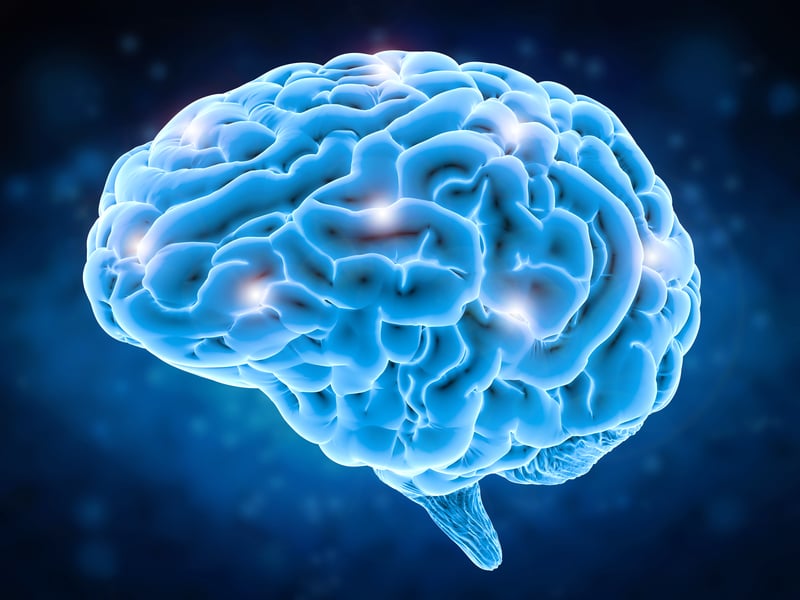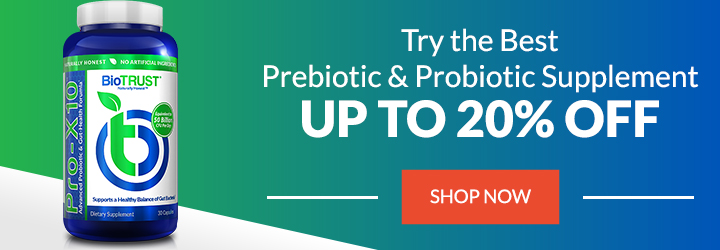Psychobiotics: The Powerful Link Between Probiotics & Mood

Do you remember The Muppets? Did you or your kids watch Sesame Street? Did you ever see the Disney® movie Pinocchio? While these kids’ classics surely share numerous similarities, there’s one obvious common thread. That is, all the main characters are puppets—people or animals moved or controlled by some external source.
What does that have to do with you? Well, you might think I’m crazy, but you, too, are a puppet. But instead of an external source, a horde of microscopic puppet masters living inside you controls (or at least profoundly influences) countless bodily programs and functions. These include developing the immune system, making nutrients, and defending against infection, to name a few.
At the forefront, these microscopic puppet masters (also known as the microbes, including probiotics, that inhabit your digestive tract) produce neurochemicals important for brain function. Along those lines, emerging evidence supports the use of key probiotics—called psychobiotics—as useful dietary strategies for mental and emotional health.
Psychobiotics: The Link Between Probiotics and Mental Health
You’ve probably heard of “probiotics,” defined as “live microorganisms that, when administered in adequate amounts, confer a health benefit on the host.” 1 Psychobiotics take the concept of probiotics a step further. And researchers define psychobiotics as “live microorganisms that, when ingested in adequate amounts, produce a health benefit in patients suffering from psychiatric illness.” 2
In other words, psychobiotics are a special class of probiotics that support mood and mental health. That’s right, the potential benefits of probiotics far exceed the digestive tract.
Isn’t the human body incredibly fascinating?
How do psychobiotics work? From a mechanistic standpoint, studies reveal the antidepressant effects of psychobiotics are closely related with the regulation of the gut-brain axis. 3
This “axis” provides an avenue whereby the gut microbiota has the capability to communicate with the brain and vice versa. On a fundamental level, the gut microbiota interacts with its human host in a joint relationship. The host intestine provides the bacteria with an environment to grow, and the bacterium aid in the homeostasis of the host. (That’s YOU!)
This communication occurs, in part, via the vagus nerve, a component of the parasympathetic nervous system, also known as the “rest and digest” branch of the autonomic nervous system. Although an overly simplistic distillation, this system works in opposition of the sympathetic nervous system, also known as the “fight or flight” branch of the autonomic nervous system.
Along these lines, you may have heard the gut termed the “second brain.” It has its own entire nervous system network called the Enteric Nervous System (ENS). This system has approximately 100 million neurons. The ENS is the third component of the autonomic nervous system and represents another pathway of the gut-brain axis communication.
The ENS uses/secretes most of the same neurotransmitters as the Central Nervous System (CNS). This includes half of its dopamine, a large quantity of melatonin, and 90 – 95% of the body’s serotonin, which is heavily involved in feelings of wellbeing.
Psychobiotics: How Probiotics Affect Mood
In the last several years, certain psychobiotics have been reported to dampen inflammation and reduce cortisol levels, resulting in improvement of symptoms of anxiety and depression. 4,5
Psychobiotics, which some refer to as “mind-altering” probiotics, are also capable of producing and delivering neuroactive substances. This includes gamma-aminobutyric acid (GABA) and serotonin (the “happy” chemical), which act across the gut-brain axis. For instance, serotonin can reduce levels of cortisol (the “stress” hormone) and increase levels of oxytocin (the “cuddle” hormone).
Meanwhile, GABA can be secreted by certain strains of Lactobacillus and Bifidobacterium species of psychobiotics. And GABA is the main inhibitory neurotransmitter in the brain. It regulates many psychological and physiological processes, and low levels of GABA are implicated in anxiety and depression. 5
Psychobiotics may also support mood through the production of short-chain fatty acids, such as butyrate, propionate, and acetate. These are essential metabolic products of gut microbial activity. Butyrate, for example, has been shown to have profound central nervous system effects on mood and behavior. 6
A third way psychobiotics appear to act on the brain and mood is by exerting effects on the body’s stress response system. This involves the brain and the adrenal glands. This system, known as the hypothalamic-pituitary-adrenal (HPA) axis, becomes dysfunctional in the context of stress or illness.
When HPA-axis dysfunction occurs, there is disruption of stress-related hormones. And this can play a central role in causing mood disorders and cognitive problems. Along these lines, psychobiotics have been shown to downregulate the HPA axis and the glucocorticoid (cortisol) stress response. 7
Psychobiotics may also flex their mind-altering muscle through anti-inflammatory actions. Chronic exposure to elevated pro-inflammatory cytokines and persistent alterations in neurotransmitter systems can lead to psychiatric disorders and depression. Psychobiotics are capable of regulating the body’s response to inflammation by reducing the production of pro-inflammatory cytokines and stimulating the release of anti-inflammatory cytokines.
The Research Between Probiotics & Mental Heath
Both clinical and animal research have shown that supplementation with psychobiotics can have a powerful impact on relieving symptoms of depression. In some cases, they’ve been shown to yield effects similar to traditional antidepressant therapies.
In double-blind, randomized, placebo-controlled studies, for example, supplementation with psychobiotics alleviated depressive and anxious symptoms of patients while also improving cognition and metabolism. 3
In a study published in the British Journal of Nutrition, French researchers found two weeks of supplementation with a probiotic formulation, including Lactobacillus heretics and Bifidobacterium longum, yielded beneficial psychological effects—including improved feelings of wellbeing, less hostility, and lower cortisol levels—in healthy human volunteers. 8
In a recent study, researchers from Germany systematically analyzed 15 clinical trials to assess the effects of probiotics on mood and behavior. They found supplementation for at least four weeks with probiotics from the Bifidobacterium (e.g., B. longum, B. breve, and B. infantis) and Lactobacillus (e.g., L. helveticus and L. rhamnosus) families improved mood, reduced stress-related behaviors, and improved memory abilities. 9
According to the current body of evidence, the psychobiotics reported to have the most profound impact on mood and mental health include:
- Lactobacillus casei
- Lactobacillus helveticus
- Lactobacillus plantarum
- Lactobacillus rhamnosus
- Bifidobacterium bifidum
- Bifidobacterium longum

How to Balance Your Gut Bacteria
Now, before you go searching for magical microbes, consider that the human intestine houses an astounding number and species of microorganism—estimated at more than 1014 gut microbiota (I’m no math major, but I think that’s a quadrillion) and composed of over a thousand species.
Although there’s no ideal ratio and each person’s microbial profile is distinct, the relative abundance and distribution of bacterial species is similar among healthy individuals. And, there’s compelling evidence that gut dysbiosis and intestinal permeability (i.e., leaky gut) could be a direct cause for depressive symptoms.3,10
In case you’re not familiar, gut dysbiosis refers to an unhealthy balance of gut bacteria. This can mean having an abundance of opportunistic “bad” bacteria, insufficient amounts of commensal “good” bacteria, or lacking microbial diversity.
Gut dysbiosis and leaky gut often go hand in hand and can actually feed into each other. For example, “bad bugs” release an endotoxin called “lipopolysaccharide” (LPS), which can lead to and/or exacerbate leaky gut. In turn, leaky gut leads to increased exposure to LPS, which drives oxidative stress and inflammation, depletes levels of tryptophan and zinc (which are important for the synthesis of neurotransmitters), and provokes depressive symptoms. 11
It’s very important to note that the gut microbiota is dynamic. Over the course of your lifetime, it can be continually influenced by a variety of factors.
What factors can disrupt the delicate balance of gut microbes? Great question! There are several you have little to no control over, such as:
- Your parents/genetics
- How you were delivered (vaginally or cesarean birth)
- Whether or not you were breastfed
- The environment you were raised in (Did you play with dirt? Did you grow up around animals?)
- Whether you were given antibiotics in the first couple years of your life
- How you were fed as a child
- How old you are currently
- Whether or not you’ve had food poisoning
- Whether or not you’ve been exposed to environmental toxicants (e.g., heavy metals)
The good news—or depending on how you look at it, the bad news—is there are quite a few factors within your control. For example, the following may all compromise the integrity of the gut microbiota and contribute to gut dysbiosis by depleting levels of good bacteria or encouraging the proliferation of opportunistic microbes:
- Poor diet
- Chronic, persistent stress
- Smoking
- Excess alcohol consumption
- Certain medications (e.g., acid reducers)
- Physical inactivity and a sedentary lifestyle
- Antibacterial products
- Environmental factors (such as contaminants in food)
- Antibiotics (both in food and medicine)
Studies have shown increasing the levels of good bacteria in the gut—and improving the overall microbial ecosystem—can curb inflammation and cortisol levels, reduce symptoms of depression and anxiety, lower stress reactivity, improve memory, and even lessen neuroticism and social anxiety. 5
Probiotics and Mental Health: A Recap
Overall, the research on psychobiotics is both incredibly fascinating and promising. This novel class of probiotics opens up the possibility that the rearrangement of the gut microbiota can be highly effective for promoting mental health and feelings of wellbeing. This is currently a growing area of research, and it holds promise as a key to treating and preventing mental disorders.
Having said that, the pursuit of happiness is just as dynamic, diverse, and individualistic as the gut microbiota. There is a long list of factors that can affect the microscopic puppet masters that powerfully influence mood and mental health. In other words, while psychobiotics hold tremendous promise, don’t lose sight of the forest for the trees. They are just one piece of a larger puzzle that involves a variety of factors, many of which are well within your control.






